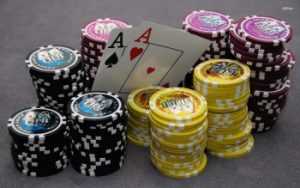
We continue. Shifts in overconfidence and supremacy. They are linked in many ways. The overconfidence bias manifests itself through a very strong belief in the correctness of one's own opinion. One study has shown striking results of this shift.
After giving a group of subjects a test sheet with the most common mistakes in words, the researchers asked the participants what they thought was the correct spelling of the word, and then asked how confident they were that their answer was correct. The subjects replied that they were 99% sure that their answer was correct, but they made 40% mistakes. This bias in poker manifests itself as a tendency to be overconfident about one's own readings, one's own calculated probabilities, and the soundness of one's strategy.
Superiority bias is the tendency of people to overestimate their abilities in subjects in which they excel or to exaggerate their weaknesses. As one can imagine, this is a fairly common bias. Most people think of themselves as being above average, when, in truth, only half of them could call themselves that. However, this bias is particularly evident when a person has few developed skills. He thinks he is simply terrible.
In poker, this can manifest itself in very different ways, depending on the player's history. Most mid-high stakes players have clearly inflated confidence in their skills. This should not be surprising when looking at their personal history. Objectively speaking, they have managed to become very good players and are among the top 0.001%. They have also managed to beat players who have outperformed them in the past. However, it is a little unreasonable for them to imagine that they have unlimited potential. Influenced by their past play, they start to think that they are much stronger than they really are and that they can beat a much stronger opponent just by inventing some magic trick. The result is an exaggerated sense of superiority, an unstoppable ego and a distorted perception of one's own skills. A perfect recipe for trouble.
At the opposite pole of this shift are players who have faced many difficulties in their careers. Perhaps they have played at lower stakes, or they have played at higher stakes in the past, but they can no longer stay in the same position. Or maybe they are just bumhunters. Driven by their conditioned history, such players are more likely to severely underestimate their skill level. They will conclude that there is no need to move on, that most of the regs are better than them, and put those who are actually better than them in the same league as the best. Players who both overestimate and underestimate themselves have a false perception of their skills. Understanding your own skill level is certainly difficult, but in the world of poker, it is very important to measure your skills correctly.
It can be observed that players who performed well are more likely to think they are excellent and capable of playing well, while players who encountered obstacles are more likely to believe they are vulnerable. This self-perception is learned, and is also often driven by a shift in validation. This shift is the tendency to seek or pay attention to information that confirms our beliefs.
For example, a player who thinks he is a good competitor will see every match he wins as proof of that. And a player who thinks he is mediocre will see every session he loses as  proof that he needs to step down and do more bumhunting. It is very possible that the percentage of sessions won and lost by both players is exactly the same. The only difference is which cognitive is given more attention.
proof that he needs to step down and do more bumhunting. It is very possible that the percentage of sessions won and lost by both players is exactly the same. The only difference is which cognitive is given more attention.
The last cognitive shift worthy of our attention is that of negligence. This bias makes us see past events as more predictable than they really were - the "I knew it" effect. The most striking examples of this can be seen in the flow of the game. Someone bets a lot twice in a row, in big back-to-back pots. There's always a chance that if you call a second time and he has the nuts you'll immediately think "God, that was so obvious, nobody bluffs like that twice in a row", but if you fold and he shows that he bluffed, you'll immediately think "Yeah, I knew it, that was such a good spot to bluff, I felt like I had to call"
In such a situation, it is best to rely on yourself. People are often not as predictable as we would like them to be. Like other shifts, this one is also difficult to navigate, especially as poker is a game of generating hypotheses and testing them. It is difficult to play it without the idea that events and people are predictable.
So, these are the psychological factors that distort the picture we see. Once we have a clearer understanding of them, we can see the game more clearly.





